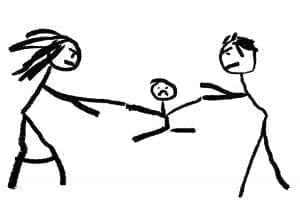 For parents who are divorced, the challenges of parenting after divorce are immense. As a co-developer and presenter of the Kids First After Divorce Program for over ten years, I am acutely aware of the challenges that separated and divorced parents experience. I have guided mothers and fathers through this difficult process, and have helped them to develop a path for parenting that protects their children.
For parents who are divorced, the challenges of parenting after divorce are immense. As a co-developer and presenter of the Kids First After Divorce Program for over ten years, I am acutely aware of the challenges that separated and divorced parents experience. I have guided mothers and fathers through this difficult process, and have helped them to develop a path for parenting that protects their children.
In negotiating the struggles of co-parenting, many parents often remark, “We now have to communicate and co-parent as divorced parents, when we couldn’t do this as parents living together in the same house. You’re asking us to do something as divorced parents, that we failed at while married. That’s going to be very tough.” That comment captures a lot. Because it speaks to the essential truth and demands that you experience as divorced parents.
Often while married, parents struggle with the challenges of parenting. They question each other’s judgments, argue over discipline, and at times, undermine each other’s authority with the children. This may be partially the actual cause behind a separation or divorce.
However, with a history of not ‘being on the same page with your parenting, divorce creates an even bigger challenge. If you are now going to improve your parenting as separated or divorced parents, you not only are tackling the challenge of learning effective parenting strategies, but you want to do this in a way that both parents are on the “same page.”
 And, yet, this is often not the case. Many parents go through the divorce process, NEVER able to reach a practical way of working together for the kids.
And, yet, this is often not the case. Many parents go through the divorce process, NEVER able to reach a practical way of working together for the kids.
Many parents struggle with their anger, hurt, frustration, rage, bitterness, and guilt, and are not able to set their feelings aside long enough to co-parent wisely.
This often blinds us, if we are not careful. We can end up getting caught in the moment of anger or frustration, and our children get caught in the middle. While the phrase is over-used to the point that it loses meaning sometimes, the truth is that children are “Caught In The Middle” and emotionally pulled in pieces by angry or battling parents.
The real damage becomes magnified if our emotions of fear, frustration, and anger also keep us from taking ownership of our own mistakes. It’s easy to point the finger, of course, and notice the mistakes of your ex-partner. In this mode, we focus blame and responsibility on the “other parent” and accept little responsibility for our choices along the way.
Amidst the overwhelming emotions of separation and divorce, this is understandable. Yet, what our children need is for us to learn to co-parent effectively.
This is not to say that this is easy. It is not. Work and effort are required. Taking ownership of your strengths and your weaknesses is also necessary.
The Truth Is That Children Can Still Thrive…IF Mom and Dad Get It Right
It is critical to say what is true, however. And the truth is this: Your children can thrive following a divorce. However, the potential for them to thrive is directly related to how effectively you and your ex-partner co-parent.
If you and your ex can communicate regarding issues that concern the children and develop an effective set of strategies for raising healthy, happy, and motivated children, your children will likely adjust adequately to a separation or divorce.
Other factors enter into the reality of your child’s adjustment to divorce. Some children are more resilient, even if they make mistakes. Some children are already at high risk and are much more vulnerable. However, whatever has happened in the past, we can conclude one very important truth: You can’t change it. It’s done.
So that means, it’s healthy, functional, and useful to focus now on what is within your control…and abandon investing your life energy into any thought, or any action, or anything…that is not within your control. Those will WASTE your life, and start you down the path of ignoring the parts that you can control. Many co-parenting programs, including my Terrific Parenting After Divorce Program, show you how to focus on the parts that do make a difference for you and your children, as well as give you the practical tools of effective co-parenting.
On the other hand, if you and your ex hold on to bitterness, anger, and hostility, and the children are caught in between, they may experience any of the following stressors:
- Relaying messages – pleasant and unpleasant – to the other parent.
- Overhearing negative comments about a parent or relative they love.
- Listening to their father or mother explode over a missing sock or a late payment.
- Experiencing emotional distance as parents struggle with sadness or anger.
- Being exposed to adult material about courts, attorneys, and judges.
- Having their time unnecessarily limited with those they love out of parental greed or anger.
- Living in fear over explosive outbursts during exchanges or phone calls.
- Learning to manipulate parents by giving parents the information that parents want to hear.
- Experiencing different consequences for the same behavior at each home.
- Having parental authority undermined by the other parent second-guessing parental actions.
- Begin judging parents too early, as they are asked questions about the other parent’s behaviors and actions.
- Find themselves used as investigators answering questions about boyfriends and girlfriends.
- Losing sleep and feeling sadness over “secrets” that they can’t share with someone they love.
- Being forced to make choices by parents whose own emotional weaknesses cause them to force their children to choose.
- Being forced to sort out “the truth”, when each parent has their version of their truth they give it to the children.
- Losing contact with grandparents, nieces, and nephews because of parental anger.
- Missing key information in class because parents disagree about schedules, and weekend changes disrupt routines and patterns.
- Carrying the emotional burden of parents who share too much of their emotional baggage with children.
And the list goes on. This is only a sample of the challenges that children must deal with in difficult divorce situations. Healthy families recognize the destructive and hurtful impact of such poor choices on children. They work hard to guard their children against exposure to these types of behaviors. Yet, many children experience parents who do not use good judgment in these situations. It is clear that these are the most predictable situations where children will struggle
What Can You Do To Help Your Child?
1. Get Rid Of Your Emotional Baggage.
 This is the first and most important step that you’ve got to take. If you harbor resentment, if you carry anger and hatred, if you’re frustrated and disappointed, if you are guilt-ridden, or if you carry any other intense emotion related to the divorce, this will get in the way of your judgment.
This is the first and most important step that you’ve got to take. If you harbor resentment, if you carry anger and hatred, if you’re frustrated and disappointed, if you are guilt-ridden, or if you carry any other intense emotion related to the divorce, this will get in the way of your judgment.
I don’t know you personally. I simply know from experience and from the research that we have on human emotion, that your judgment will be impaired if you have intense emotions or feelings about your ex.
So the first essential step is to take care of your garbage.
How might you do this? Here is a partial list:
- Contact a therapist or Parenting Coach, such as Dr. Cale, experienced in working with divorced parents.
- Begin a journal to write down your thoughts, and do so in handwriting, not on the computer.
- Find a support group of friends and family members who are not divorced.
- Attend an educational course on co-parenting after divorce.
- Find workshops on letting go of your anger after divorce.
- Go to the library, or the bookstore, and find books on releasing your feelings following a painful divorce.
- Begin to meditate, or practice daily relaxation exercises.
- Run, or exercise regularly.
- Avoid hiding by using alcohol or drugs.
- Focus your attention consistently and regularly on what you want, and not what you don’t want.
- Develop a mantra, an internal saying, that you can repeat to yourself, such as “Be kind and loving.”
- Limit yourself to ten minutes daily of giving any thought or attention to feelings of anger, frustration, etc.
- As your children go to bed each night, look deeply into their eyes, and realize that there is a little tiny “note-taker” inside their head. This note taker is keeping track and is learning from you about how to handle life’s most difficult challenges. And that note taker is always taking notes. Then ask yourself “What notes did they take today?”
You can’t give to your kids what you don’t possess. In other words, if you are feeling like life is falling apart at the seams…then YOU GET HELP.
Don’t wait. Don’t delay. Don’t make excuses. Don’t pretend you are feeling okay when your actions say otherwise.
Thus, the first step is to make sure you take care of yourself…so you will be better prepared to make good judgments about your children’s needs.
In the next step, you will learn where to get your real-life after-divorce education.













